Spring 2021 Newsletter
Message from the Director:
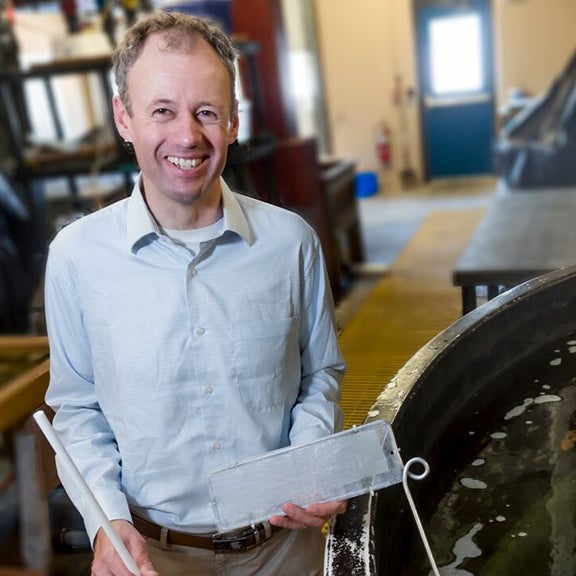 The STEEP team is grateful for the wide availability of vaccines in the U.S., and the return, albeit slow, to a less distanced, more normal way of life and research again. We mourn the many lives lost to COVID-19, and the mental impact the pandemic has had on too many. Through the eyes of STEEP’s many international partners, we are distressed to see the ongoing misery and deaths COVID is claiming in other parts of the world. The epidemic’s shifting international landscape has led STEEP to pivot FLUOROS 2021 away from a centralized get-together in the U.S., as we could not ensure that it would be a truly global event this fall. But we are pleased to announce Global FLUOROS 2021 and invite you to join us either virtually or in person. (See below)
The STEEP team is grateful for the wide availability of vaccines in the U.S., and the return, albeit slow, to a less distanced, more normal way of life and research again. We mourn the many lives lost to COVID-19, and the mental impact the pandemic has had on too many. Through the eyes of STEEP’s many international partners, we are distressed to see the ongoing misery and deaths COVID is claiming in other parts of the world. The epidemic’s shifting international landscape has led STEEP to pivot FLUOROS 2021 away from a centralized get-together in the U.S., as we could not ensure that it would be a truly global event this fall. But we are pleased to announce Global FLUOROS 2021 and invite you to join us either virtually or in person. (See below)
Going Forward: STEEP’s Aspirational Vision:
The proposed continuation of STEEP I (2017-2022) will broaden its work at contaminated sites beyond AFFF-impacted groundwater on Cape Cod. New concerns, sites, and stakeholders will include novel PFAS in the Delaware River region, atmospheric transport of PFAS in the Great Lakes region and contiguous U.S., and working with states to support risk assessment of PFAS in and beyond current drinking water MCLs. The proposed STEEP II Center will thereby provide novel approaches to support the Superfund Research Program, and its federal and state collaborators, by assessing PFAS risks via the use of detection tools in the field combined with mechanistic modeling and statistical approaches that show promise as decision-support tools. Integrated molecular, rodent, and human studies will assess the pathways, processes, and critical health effects of PFAS, with a particular focus on the vulnerable early stages of developing children. STEEP II aims to explore possible intervention points to reduce PFAS uptake and to identify human biomarkers of exposure to PFAS.
 Research Highlights
Research Highlights
Isolating the AFFF Signature in Coastal Watersheds Using Oxidizable PFAS Precursors
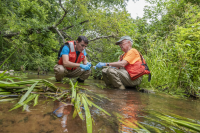
The Sunderland lab has developed a novel PFAS testing method, combining multiple analytical and statistical techniques to measure the PFAS source signature in watersheds on Cape Cod and reveal the presence of additional unknown organofluorine chemicals that were previously overlooked. Read More…
New insights into the binding of PFAS to albumin protein
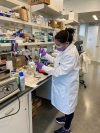
STEEP trainee Jessica Alesio has completed new research that helps to explain the specific ways different PFAS chemicals bind with albumin proteins and pass throughout the human body. Read More…
Slitt Group Published Three Papers on PFOS and Pro-Obesity Effects

Dr. Angela Slitt’s laboratory recently published findings that PFOS administration can interfere with the benefits of calorie restriction and insulin functions, suggesting that PFOS could have some pro-obesity effects. Read More…
Technology Used to Quantify Gene Expression from PFAS Exposure Used to Develop COVID-19 Test
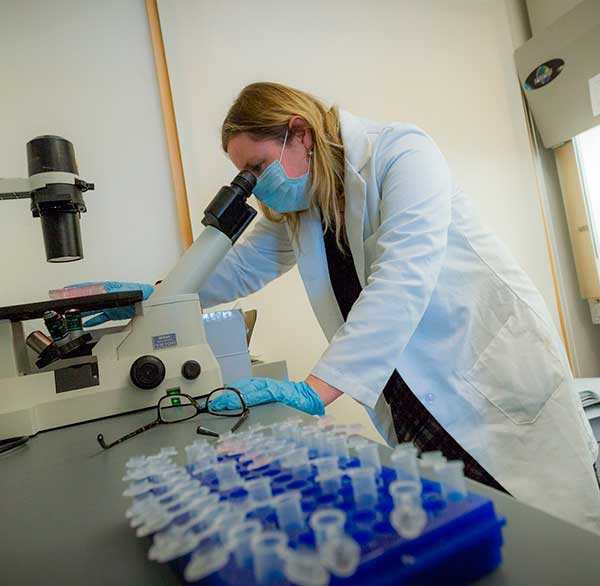
Professor Angela Slitt and her team have developed a new saliva-based COVID-19 test that uses branched DNA assay technology. Read More…
 Events
Events
STEEP Trainees Deliver “PFAS In Our World” Virtual Conference – A Huge Success!
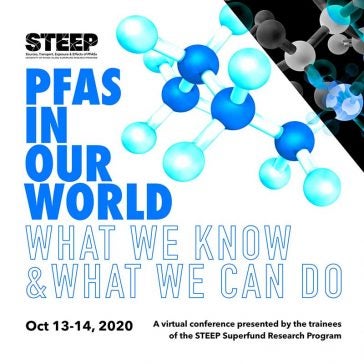
When STEEP postponed the FLUOROS 2020 conference due to Covid-19 concerns, the Training Core took the initiative to coordinate and host a virtual conference held in October 2020. Read More…
Welcome to FLUOROS Global 2021
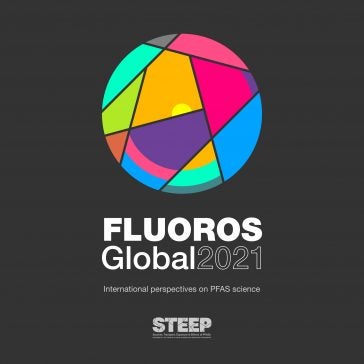
FLUOROS Global 2021 will be held this October in Providence, Rhode Island and around the world. Run by STEEP and other international partners, it will encompass a global network of presentations discussing the ongoing and needed research to address the global scope of PFAS contamination. Read More…
Community-based PFAS Communication Training and Competition May 27th & June 17th
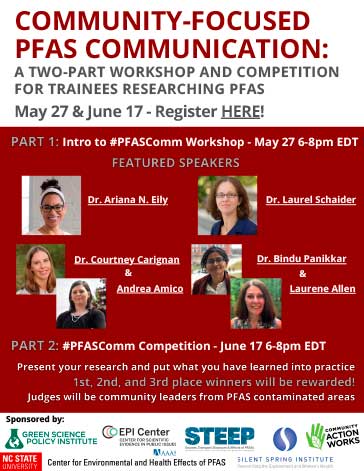 STEEP pleased to support SRP trainees PFAS communication training and competition focused on building skills needed to communicate with communities directly impacted by PFAS contamination and share complex science with non-scientists. Read More…
STEEP pleased to support SRP trainees PFAS communication training and competition focused on building skills needed to communicate with communities directly impacted by PFAS contamination and share complex science with non-scientists. Read More…
 Program Updates
Program Updates
New STEEP Faculty, Dr. Emily Diamond, joining Community Engagement Core
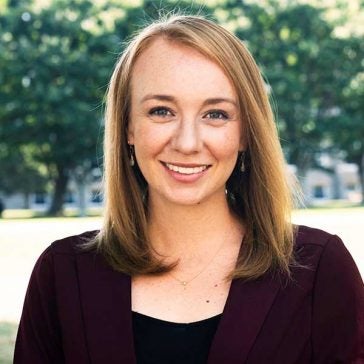
Assistant Professor Emily Pechar Diamond, Ph.D. joins STEEP’s Community Engagement Core beginning with a focus on the potential health impacts of PFAS on the Mashpee Wampanoag ‘s seafood dietary intake. Read More…
STEEP trainee Emily Marques joins University of Massachusetts-Amherst as a postdoctoral fellow

Recent STEEP graduate, Emily Marques is now a postdoctoral fellow at the University of Massachusetts-Amherst, where she works on zebrafish to evaluate developmental toxicity to environmental toxicants.
 Community News
Community News
“Let’s Talk About PFAS”— New monthly webinar series

STEEP has organized a new monthly webinar series called “Let’s Talk About PFAS,” to help communities address contamination and reduce exposures. Topics will include drinking water, human health, consumer products, and essential uses. Read More…
STEEP Investigates Community Concerns about potential PFAS contamination
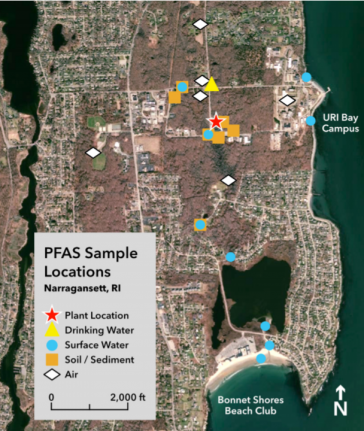
In response to community concerns about odors and potential PFAS contamination emanating from a local plastics plant, STEEP scientists collected and analyzed environmental samples from areas in proximity to the plant in Narragansett, RI. Read More…
Dr. Laurel Schaider presents at local community forums

STEEP Scientist Laurel Schaider presents research updates to Cape Cod residents and shares upcoming plans for The Massachusetts PFAS and Your Health Study, as part of a nationwide effort to study affected communities across the country. Read More…
STEEP Researchers Testify at Rhode Island State Hearing on PFAS regulations
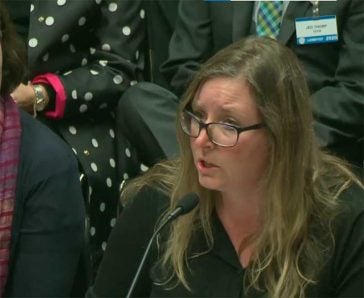
STEEP researchers Laurel Schaider and Angela Slitt testify at state hearing in favor of PFAS regulation in food packaging and drinking water. Read More…
Awards and Achievements
STEEP Director Rainer Lohmann wins Fulbright award
 STEEP Director Dr. Rainer Lohmann wins a 2021-2022 Fulbright Arctic Initiative Award, as part of a team of researchers from the United States, Canada, Russia, and Scandinavian Nations to address key research and policy questions related to creating a secure and sustainable Arctic. Collaborating with Faroese officials and community members, Dr. Lohmann’s research aims to assess and quantify the role of indoor household and consumer products as a pathway for exposure to persistent organic pollutants, including PFAS, with the goal of helping Artic communities improve and sustain human health.
STEEP Director Dr. Rainer Lohmann wins a 2021-2022 Fulbright Arctic Initiative Award, as part of a team of researchers from the United States, Canada, Russia, and Scandinavian Nations to address key research and policy questions related to creating a secure and sustainable Arctic. Collaborating with Faroese officials and community members, Dr. Lohmann’s research aims to assess and quantify the role of indoor household and consumer products as a pathway for exposure to persistent organic pollutants, including PFAS, with the goal of helping Artic communities improve and sustain human health.
Dr. Angela Slitt wins URI Foundation & Alumni Engagement Scholarly Excellence Award
 Dr. Angela Slitt, Professor of Biomedical and Pharmaceutical Sciences College of Pharmacy, announced as recipient of URI Foundation & Alumni Engagement 2021 Scholarly Excellence Award. The winner of this award is nominated in large measure by her peers and selected by a committee of former Scholarly Excellence Award recipients. The STEEP team congratulates their colleague and underscores her worthiness of this honor.
Dr. Angela Slitt, Professor of Biomedical and Pharmaceutical Sciences College of Pharmacy, announced as recipient of URI Foundation & Alumni Engagement 2021 Scholarly Excellence Award. The winner of this award is nominated in large measure by her peers and selected by a committee of former Scholarly Excellence Award recipients. The STEEP team congratulates their colleague and underscores her worthiness of this honor.
STEEP Trainee Accomplishments
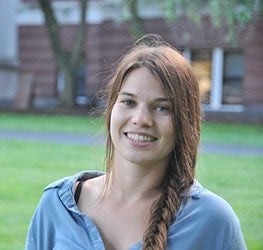

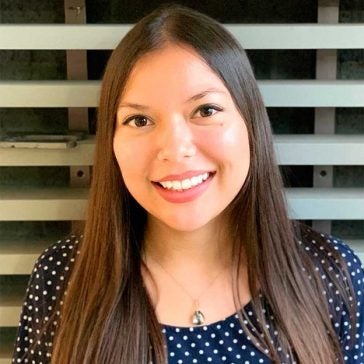
Voices From STEEP
“Everest is treasured very highly as a unique monument for the globe…We say, ‘Take nothing but pictures, leave nothing but footprints,’ but we leave chemicals.” –Rainer Lohmann, Washington Post Read full story here
“We need a class-based solution that phases out nonessential uses of PFAS.” –Laurel Schaider, Providence Journal Read full story here
“We’re simply not testing for most PFAS compounds, so we have no idea what our total exposure is to these chemicals and health data associated with such exposures are still lacking.” –Elsie Sunderland, Harvard Gazette Read full story here
“We already have a public health crisis in this country with PFAS contaminating drinking water, and we don’t want to make the situation worse [referencing use of PFAS-laden pesticides sprayed to suppress mosquitoes].”–Laurel Schaider, Boston Globe Read full story here
“[Treating all PFAS as a group] is really the only way that we can be ahead of the curve. Rather than always realizing that a compound is toxic once it’s already everywhere and we measure it on a remote ice-site somewhere in Greenland.” –Charlotte Wagner, Massive Science Read full story here
“At the end of the breast-feeding period, the child may have a serum concentration of PFAS that may be 10 times higher than the mother’s because the mother is essentially eliminating PFAS from her body. Her serum concentrations go down, and the child cannot excrete them. So, they just keep on building up in the baby’s body.”*** –Philippe Grandjean, NOVA PBS Read full story here
“PFAS in wildlife is kind of the wild west. Wildlife are inherently difficult to study in a lot of ways… As humans, we rely on every natural resource under the sun, when we undercut a healthy environment, we undercut our own health.” –Anna Robuck, Massive Science Read full story here
“[PFAS] will slowly trickle into the soil, and then move further down and eventually reach the groundwater, which will then be pumped up by someone for drinking purposes.” –Rainer Lohmann, News Center Maine Read full story here
*** Despite PFAS, the value of breast milk remains significant for early development of immune system, and the CDC continues to recommend 6 months of breastfeeding for newborns.
Read the 2025 Issue 1 Newsletter
Read the 2024 Issue 2 Newsletter
Read the 2024 Issue 1 Newsletter
Read the Spring/Summer 2023 Newsletter
Read the Winter 2023 Newsletter
Read the Winter 2022 Newsletter

